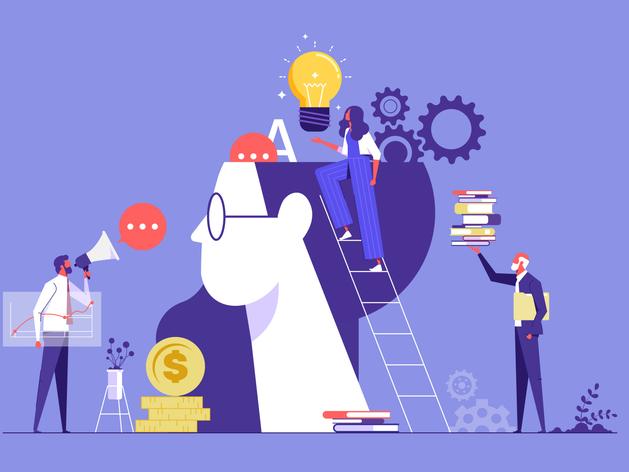
When it comes to digital upskilling, sharing is caring
Launching a digital upskilling product is one thing but getting staff to use it is quite another. Katie Steen and Dave Weller harnessed the power of personalisation to get that all-important buy-in
You may also like
Popular resources
Encouraging people to take part in training and development can be difficult at the best of times, but when you throw the word “digital” into the mix, it can make many want to run for the hills! A lack of time, knowledge of where to begin and a general anxiety that seems to surround the whole subject of anything digital, can make it an uphill struggle for anyone with “digital upskilling” in their job description – let alone when it’s for 40,000 staff and students, as it is for us at the University of Exeter.
Our 2030 Digital Strategy states that “we will find ways for people to develop digital skills quickly and apply them to real working situations” and “enable people to get stuff done” so the focus on upskilling the university community is a clear priority.
- How students’ GenAI skills and reflection affect assignment instructions
- Open educational resources to make lifelong learning accessible to all
- The digital shift will have many (positive) side-effects
What was obvious to us when we started in our newly created roles 10 months ago was that to achieve our target of upskilling more than 40,000 people, we needed to think differently – no more relying on face-to-face sessions or bespoke webinars. We want our staff and students to be able to access upskilling tools at any time that suits them, so ensuring access to quality asynchronous materials was essential.
To make something that would appeal to most people we needed to involve and listen to as many stakeholders as possible to truly understand their wants, needs, challenges and fears. This enables us to co-create solutions with our users for our users. We decided to initially focus on the people on the ground, such as line managers and student support teams, to enable us to understand and guide our thoughts towards the best way to proceed. Over time, we’ve met with more and more stakeholders and are receiving increasing levels of support throughout the institution.
What are the fundamentals of our digital skills initiative?
“Supportive”, “personalised” and “familiar” are words that have guided our approach from the beginning. From our hundreds of hours of user research and stakeholder engagement, we knew that people wanted to be advised on how they could digitally develop but it had to be in a way that was supportive and personalised to them, and at a time of their choosing – and, critically for the institution, data-driven.
By developing our own digital assessment tool, we have been able to co-create the solution with our users, getting feedback as we iterate and ensure it solves our users’ problems and adds value to their education, research, work and lives at Exeter. We’re also able to design the user journey from start to finish, personalising the experience of the tool to our users’ specific needs – something that we just wouldn’t get from an off-the-shelf assessment tool.
Fortunately, the digital team at the University of Exeter are already set up to develop products, so we’ve had access to a great team of in-house software developers and designers. This has enabled us to build a working prototype of a bespoke digital skills self-assessment tool, which uses the Jisc building digital capabilities framework. It identifies from individuals what their digital capabilities are and provides them with their own personalised and private dashboard that stores their results – showing them their progression over time.
Anonymised results are also held within an institutional dashboard, allowing line managers through to heads of departments and senior leaders to gauge the various levels of digital capability across the institution. All data is anonymised and no teams smaller than six people can be viewed.
But this is where our self-assessment tool really gets exciting. Based on the individual’s results, it suggests specific learning resources that are directly contained within our own digital skills library.
Sharing is caring when it comes to building resources
What was abundantly clear from the beginning of our journey was that there was a huge amount of high-quality, digitally focused resources that had been made in house, by experts within their fields. By virtue of them being made by peers, these materials also came with the bonus of having that extra-familiar, personalised appeal to Exeter stakeholders. When looking at developing resources for our new digital skills library, we saw no need to start from scratch – and, in fact, many benefits in not doing so.
Realising this potential, we have made it our mission at any available opportunity to encourage everyone within the university to share either materials they’ve made or personally used to digitally upskill. Creating a team approach and promoting the “sharing is caring” motto has resulted in us gathering hundreds of high-quality resources. It’s also garnered lots of interest from stakeholders keen to work with us in developing new materials, which can be used for the benefit of everyone, including their own teams and departments.
A knock-on effect from taking such a united approach has been a growing sense of vested interest, understanding and positive internal promotion. Our buy-in crusade is already in motion!
When will it be ready?
The main question we now get when we show our beautiful prototype, is “It looks lovely, but when will it be ready for us to use?” In the digital team at Exeter we use Agile ways of working, so we are beginning with launching a minimum viable product (MVP) of the diagnostic tool to pilot with groups of colleagues across the university. This will enable us to gather feedback and make improvements to the tool, releasing updated iterations over time in readiness to launch to all colleagues and then to other user groups such as students and the wider university community.
This approach means that we can provide value to our staff and students faster, and can ensure we are developing a user-led product with insight and feedback at the heart of it, making sure we are solving problems for our users, with our users!
What’s also really important to us is that this is not just an initiative that focusses on digitally upskilling people for the workplace, but also supports their personal lives. We can help educate them about e-safety, or enhance their digital well-being, for example.
For anyone about to start or already under way with a similar journey, our key suggestions would be:
- Co-create, involve as many people as possible – listen, reflect, listen again.
- Be clear on your end goal and ensure there are tangible milestones that stakeholders can see along the way.
- Be honest and transparent in your approach, create a sense of energy and excitement – change mindsets!
Katie Steen and Dave Weller are digital skills leads at the University of Exeter.
If you would like advice and insight from academics and university staff delivered direct to your inbox each week, sign up for the Campus newsletter.





Comments (0)
or in order to add a comment